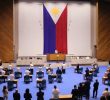DAVAO CITY – Two progressive partylist organizations described as “government ineptitude” on its move to reduce the number of regular school days as solution to shortage of teachers and classrooms.
The Gabriela Women Partylist and the Alliance of Concerned Teachers Partylist (Act) reacted strongly with a challenge to President Benigno Aquino III to disclose the real state of education, as it dismissed as inaccurate on his claim before an international economic forum that the country has completed the backlog on classrooms.
But the real state of education, the two groups said, is shown by the move of the Deparatment of Education to trim down the regular five-day weekly classes to only three days In Metro Manila.
“What will our children learn with shortened class hours and fewer days in school?” asked Gabriela representative and retired teacher Luzviminda Ilagan.
The three-day system, said to be implemented in Metro Manila, would have one set of class set on Monday–Wednesday–Friday schedule, and the other on Tuesday–Thursday–Saturday. Classes will be held from 6:00 am to 6:00 pm.
“DepEd’s proposal to reduce the five-day class schedule to only three days Is the latest proof of the Aquino government’s ineptitude and utter abandonment of its obligation to ensure that every Filipino child enjoys the basic right to education,” Ilagan said.
While the new system would be implemented in Metro Manila, Elenito Escalante, chairman ACT Davao said that “this shows that the government has not put priority to address the shortages in public schools”.
“With just less than a week before school opens, we see this as a blooper for Aquino who said earlier that classroom shortages have been fixed. Education is not the priority of this government,” Escalante said.
President Benigno Aquino III told the World Economic Forum last week that the backlog in classroom construction had been addressed by having 66,813 classrooms built.
A national television probe made after this announcement indicated that the reduction in classroom shortage may have been ascribed to strategies of many public schools in implementing two shifts, with one group of grade schoolers and high school students assigned to the morning shift, and the others to the afternoon shift. The morning shift starts much earlier as the regular class that formerly starts at 7:00 am.
DepEd spokesperson for the Davao Region, Jenelito Atillo, said there is a shortage of 1,011 classrooms in the elementary level and 550 in secondary schools.
Atillo told the Radyo ni Juan radio station here that the shortage was further worsened with the exodus of students from private to public schools due to economic reasons, including the periodic increase in tuition and other fees.
There are 1,632 public elementary schools and 301 public high schools in the Davao region. The region is composed of Davao City, Compostela Valley and the four Davao provinces.
Atillo said the increase in students entails need for more facilities. But another concern, he said, is that parents have enrolled their children in central public schools in downtown areas, contributing to congestion of classrooms.
ACT Vice Chairperson, Joselyn Martinez, challenged the Aquino administration to come up with concrete solutions such as completing the backlogs in teachers and classrooms.
“We call on the DepEd leadership and to Pres. Aquino himself to be truthful and face the problems of public education accordingly. These schemes will not solve the problem at all. What they need to do is simple and basic – add permanent items for teachers, construct additional classrooms and facilities and quit from making cheap gimmickry and rhetoric” said Martinez. (davaotoday.com)










